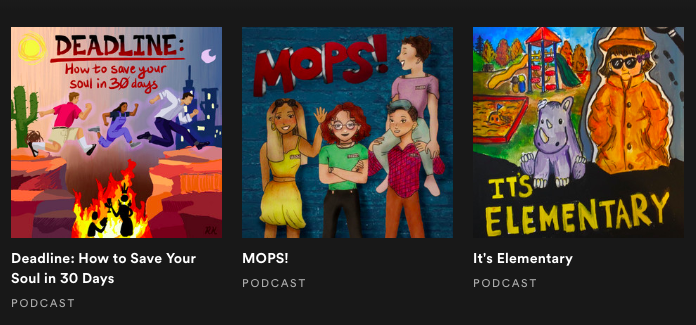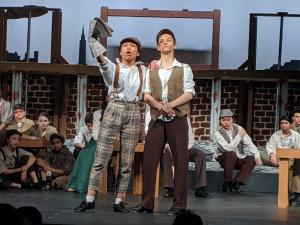TJ Theater Arts releases podcasts as fall productions
The cover arts for the three TJTA podcasts that have been released on Anchor and Spotify.
November 29, 2020
TJ Theater Arts (TJTA) recently released three podcast series, titled “It’s Elementary,” “MOPS!,” and “Deadline: How to Save Your Soul in 30 Days,” on Nov. 9, Nov. 11, and Nov. 13, respectively. New episodes for each are set to be released weekly on the platforms Anchor and Spotify.
Because of social distancing procedures, TJTA was unable to produce and perform a fall play, so they’ve turned to podcasts as a replacement.
While “Deadline: How to Save Your Soul in 30 Days” tells the story of three recently deceased souls searching for a mysterious artifact to escape eternal damnation, “It’s Elementary” follows five-year-olds Kate and Benji as they solve mysteries together on their school playground. “MOPS!” stands for “Magnificent Occurrences Purification Services,” and focuses around this organization as it cleans up the disasters left behind by main character Superperson wherever he goes.
Actors and script writers alike faced challenges with the podcasts. Actors had to learn how to alter their voice so listeners could differentiate between characters, and many of the scriptwriters had little to no experience working with the new format.
With the lack of visual aid in podcasts, the facial expressions of actors were also lost, and it was more difficult to convey who is speaking to whom. Jefferson junior Zander Kuebler was one of the writers of “It’s Elementary” and the voice of Superperson on “MOPS!” He shared how Jefferson theater students were able to overcome such difficulties.
“We all kind of stepped up to the challenge, because we all love [TJTA] so much and really wanted to be able to experience it in whatever way possible [despite] the virtual circumstances,” Kuebler said.
Kuebler noted that having diverse writing teams, composed of students from different grades and backgrounds, helped each podcast come together. The variety of perspectives and personalities, along with the authority students were given over their podcasts, allowed them to create storylines that they were proud of and passionate about.
“I never could have thought of [the plot] alone, and I don’t think anyone else could have either,” Kuebler said. “It was all about bringing everything together, and it was really cool to be able to [collaborate creatively].”
Kuebler also accredited the interactions between the actors and the writers to have helped the podcast shine. With at least one writer in every rehearsal, actors could ask the writers questions or the writers could make suggestions.
“[The writers] as well as the actors [work to] figure out how [to perform the lines] in character and how the actor wants to read it,” Kuebler said. “Everyone’s input is valued, and nothing could work without each person.”
Links to the podcasts can be found on the TJTA website.









